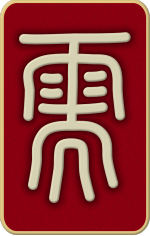
需 Xū Pausing (Halting) [hexagram 5]


Water over Heaven
 Water element
Water element
Lunar month: 2 ; Host (controlling) line : 5
The Decision
Pausing. If genuine all will go well, if resolute then it will be favorable. A great journey is beneficial.
Pausing, there is danger ahead. Despite position of strength, hold back. Pausing brings success and with resolve there will be good fortune. Because it is in the correct place according to the stars, a great journey will be followed by well-deserved success.
需: 有孚, 光亨, 贞吉. 利涉大川. Xū: yǒu fú, guāng hēng, zhēn jí. lì shè dà chuān.
彖传: 需, 须也; 险在前也. 刚健而不陷, 其义不困穷矣. 需有孚, 光亨, 贞吉. 位乎天位, 以正中也. 利涉大川, 往有功也. Tuàn zhuàn: Xū, xū yě; xiǎn zài qián yě. gāng jiàn ér bù xiàn, qí yì bù kùn qióng yǐ. xū yǒu fú, guāng hēng, zhēn jí. wèi hū tiān wèi, yǐ zhèng zhōng yě. lì shè dà chuān, wǎng yǒu gōng yě.
The Image
Clouds filling the sky. Pausing. So, it is appropriate to joyfully eat and drink.
象传: 云上于天, 需; 君子以饮食宴乐. Xiàng zhuàn: Yún shǎng yú tiān, xū; jūn zǐ yǐ yǐn shí yàn lè.
Line Change 1
Pausing on a far boundary. It is wise to persevere.
‘Pausing on a far boundary’ – it would be rash to wander away. ‘It is wise to persevere’ – remain there as normal.
初九: 需于郊. 利用恒, 无咎. Chū jiǔ: xū yú jiāo. lì yòng héng, wú jiù.
象传: 需于郊, 不犯难行也. 利用恒, 无咎; 未失常也. Xiàng zhuàn: Xū yú jiāo, bù fàn nán háng yě. lì yòng héng, wú jiù; wèi shī cháng yě.
Line Change 2
Waiting on the sand. Ignore the tittle-tattle and eventually there will be good fortune.
‘Waiting on the sand’ – standing calmly in the middle. ‘Ignore the tittle-tattle’ – await the promising outcome.
九二: 需于沙. 小有言, 终吉. Jiǔ èr: xū yú shā. xiǎo yǒu yán, zhōng jí.
象传: 需于沙, 衍在中也. 虽小有言, 以终吉也. Xiàng zhuàn: Xū yú shā, yǎn zài zhōng yě. suī xiǎo yǒu yán, yǐ zhōng jí yě.
Line Change 3
Waiting on mud. Danger of injury.
‘Waiting on mud’ – calamity is close to hand. ‘Danger of injury’ – so must remain calm and careful.
九三: 需于泥, 致寇至. Jiǔ sān: xū yú ní, zhì kòu zhì.
象传: 需于泥, 灾在外也. 自我致寇, 敬慎不败也. Xiàng zhuàn: Xū yú ní, zāi zài wài yě. Zì wǒ zhì kòu, jìng shèn bù bài yě.
Line Change 4
Waiting in a pit. Eventually will escape.
‘Waiting in a pit’ – need to accept the situation.
六四: 需于血, 出自穴. Liù sì: xū yú xuè, chū zì xué.
象传: 需于血, 顺以听也. Xiàng zhuàn: Xū yú xuè, shùn yǐ tīng yě.
Line Change 5
Waiting for a feast. With determination all will be well.
‘Waiting for a feast.’ – all is centered and correct.
九五: 需于酒食, 贞吉. Jiǔ wǔ: xū yú jiǔ shí, zhēn jí.
象传酒食贞吉,以中正也. Xiàng zhuàn: Jiǔ shí zhēn jí, yǐ zhōng zhèng yě
Line Change 6
Entering a pit but three friends come in uncalled for; if welcomed with due respect all will turn out well.
‘Unexpected friends come in and if welcomed with due respect all will turn out well’ – although inappropriate there is no crisis.
上六: 入于穴, 有不速之客三人来, 敬之终吉. Shǎng liù: rù yú xué, yǒu bù sù zhī kè sān rén lái, jìng zhī zhōng jí.
象传: 不速之客来, 敬之终吉. 虽不当位, 未大失也. Xiàng zhuàn: Bù sù zhī kè lái, jìng zhī zhōng jí. suī bù dàng wèi, wèi dà shī yě.
The full set of 64 English translations is available in our new book 'Book of Changes - Deciphered' ➚.